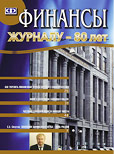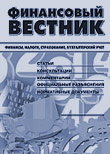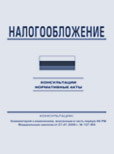Содержание
АКТУАЛЬНО
E-mail: finance-journal@mail.ru
В номере опубликовано выступление Министра финансов РФ А.Г. Силуанова 10.03.2022 на совещании главы государства с членами Правительства РФ, в котором приведены принятые Правительством РФ меры в ответ на финансово-экономическую войну против России, развернутую западными государствами.
Ключевые слова: санкции, финансовый рынок, бюджет.
ФИНАНСЫ И БЮДЖЕТ: ПРОБЛЕМЫ И РЕШЕНИЯ
Н.М. Сабитова, профессор кафедры финансовых рынков и финансовых институтов Казанского федерального университета, доктор экономических наук, профессор
E-mail: NMSabitova@kpfu.ru
В последние годы рисковые ситуации стали возникать значительно чаще, что повышает интерес к проблемам их изучения, в том числе и в бюджетно-налоговой сфере. Эти риски, называемые автором в соответствии с международной практикой фискальными, характерны для бюджетных систем всех стран, Российская Федерация не исключение. При этом данная проблема затрагивает все уровни бюджетной системы. Вопросы управления фискальными рисками связаны с их идентификаций, что невозможно без их четкой классификации по определенным признакам. По источнику возникновения эти риски делятся на системные и несистемные. В статье рассматриваются факторы, определяющие системные и несистемные фискальные риски субъектов РФ. Факторы, определяющие системные фискальные риски субъектов РФ автором разделены на две группы: возникающие вне страны и внутри страны, дана им характеристика. Доказывается, что системные фискальные риски влияют на субъекты РФ в разной степени. Дана характеристика несистемным фискальным рискам субъектов РФ. Автор предлагает ввести в систему мониторинга финансового положения и качества управления финансами субъектов РФ новое направление «Оценка фискальных рисков субъектов РФ» с учетом их деления по источнику возникновения, что позволит повысить ответственность субъектов РФ за принятие решений в бюджетно-налоговой сфере.
Ключевые слова: фискальные риски, источники рисков, системные и несистемные риски, факторы рисков.
Л.Р. Ковтун, доцент кафедры финансов и финансовых институтов Байкальского государственного университета, кандидат экономических наук
E-mail: lira-tim@yandex.ru
В настоящее время планомерно и последовательно претворяются конкретные меры в практику управления общественными финансами, цель которых создать организационные и правовые предпосылки для повышения эффективности бюджетных расходов. Одним из инструментов последнего выступает государственное задание. Причем эффективность должна быть реализована не только на конечном этапе при расходовании средств бюджета, но и на этапе планирования видов, объемов государственных услуг, планирования расходов бюджетов бюджетной системы страны, направляемых на оказание государственных услуг. Функционал государственного задания позволяет решать обозначенные задачи.
Ключевые слова: государственное задание, эффективность бюджетных расходов, бюджетная реформа, система управления общественными финансами.
КАЗНАЧЕЙСТВО: СТАНОВЛЕНИЕ И РАЗВИТИЕ
А.П. Суконкин, директор Федерального казенного учреждения «Центр по обеспечению деятельности Казначейства России»
E-mail: fku@roskazna.ru
Т.А. Ставрова, заместитель главного технолога Федерального казенного учреждения «Центр по обеспечению деятельности Казначейства России»
E-mail: tastavrova@mail.ru
Основной составляющей системы управления рисками организаций – участников бюджетного процесса является управление бюджетными рисками. В качестве одного из инструментов управления бюджетными рисками может выступать внутренний финансовый аудит. В статье отражена деятельность субъектов внутреннего финансового контроля, ведомственного контроля и внутреннего аудита ФКУ «ЦОКР» и его межрегиональных филиалов, направленная на управление бюджетными рисками.
Ключевые слова: внутренний финансовый аудит, внутренний финансовый контроль, управление бюджетными рисками, ФКУ «ЦОКР», межрегиональные филиалы ФКУ «ЦОКР», субъекты бюджетных процедур.
НАЛОГИ: ТЕОРИЯ И ПРАКТИКА
В.Г. Пансков, профессор-исследователь Департамента налогов и налогового администрирования Финансового университета при Правительстве РФ, заслуженный экономист Российской Федерации, государственный советник налоговой службы I ранга, доктор экономических наук, профессор
E-mail: 5868116@mail.ru
Автор обобщает итоги дискуссий, которые велись в научном сообществе, во властных структурах, в СМИ по введению в России налога на богатство (роскошь). Отнесение к категории роскоши того или иного предмета зависит и от его стоимости. Со временем все большее число людей начинает пользоваться облагаемыми налогом на роскошь отдельными предметами, и они переходят в категорию предметов потребления представителей среднего класса. Проведенные в последние несколько лет в России корректировки ставок налогов на имущество и доходы физических лиц нет оснований характеризовать как полноценные налоги на богатство, это разве что его аналоги, полагает автор. К настоящему времени большинство государств отказалось от взимания классического налога на богатство. Там же, где он введен на отдельные предметы роскоши, большого фискального значения он не имеет. Налог на роскошь не способствует достижению большей социальной справедливости в странах, где он действует.
Ключевые слова: налог на богатство (роскошь), стоимость предмета обложения, фискальный эффект, корректировки ставок на доходы и имущество, социальная справедливость, потребители из среднего класса.
Н.П. Мельникова, профессор Департамента налогов налогового администрирования Факультета налогов, аудита и бизнес-анализа Финансового университета при Правительтве Российской Федерации, кандидат экономических наук, доцент
А.В. Тихонова, доцент Департамента налогов налогового администрирования Факультета налогов, аудита и бизнес-анализа Финансового университета при Правительтве Российской Федерации, доцент кафедры статистики и кибернетики РГАУ-МСХА им. К.А. Тимирязева, кандидат экономических наук, доцент
E-mail: avtihonova@fa.ru
Статья посвящена анализу принципов установления и применения налоговых льгот, бенефициарами которых выступают физические лица. Авторами приведены и раскрыты с помощью приемов ретроспективного анализа три принципа фискального стимулирования: 1) обоснованность выбора категорий налогоплательщиков; 2) предупреждение возможностей злоупотребления льготами; 3) учет объективной неоднородности материального положения бенефициаров льгот. Также предложены направления совершенствования механизмов применения налоговых стимулов.
Ключевые слова: налоговые льготы, преференции, физические лица, социальная поддержка, социальное неравенство, черта бедности, бенефициары.
КОРПОРАТИВНЫЕ ФИНАНСЫ
В.С. Левин, профессор кафедры бухгалтерского учета, анализа и аудита Оренбургского государственного университета, доктор экономических наук
E-mail: vslevin@mail.ru
В статье рассматриваются сущность, тенденции и противоречия в раскрытии публичной нефинансовой информации для целей оценки ESG-рисков. Отмечается неготовность общества, бизнеса и власти к всеобъемлющему раскрытию компаниями публичной нефинансовой информации в рамках концепции устойчивого развития. Обращается внимание на необходимость повышения роли субъектов Российской Федерации в достижении целей устойчивого развития.
Ключевые слова: цели устойчивого развития, ESG-риски, корпоративное управление, раскрытие информации, нефинансовая отчетность, заинтересованные стороны.
МНЕНИЯ
Б.М. Ческидов, действительный член Академии военных наук, доктор экономических наук, доцент
E-mail: state2017@icloud.com
В статье рассматривается возможность использования анализа наиболее распространенных макроэкономических показателей для оценки эффективности санкций в отношении финансовой инфраструктуры подвергнутых им государств. Оценивается потенциальная достоверность полученных в результате такого анализа результатов, для ряда показателей предлагаются верифицирующие переменные. Делается вывод о том, что наиболее достоверные результаты могут быть получены в результате анализа реакции отдельных групп населения на санкционное воздействие, постулируются преимущества такого подхода.
Ключевые слова: финансовая инфраструктура, санкции, ВВП, государственный бюджет (доходы, расходы), приток иностранных инвестиций, состояние государственного долга, экспорт, импорт, инфляция, курс национальной валюты, стоимость привлечения инвестиций и заимствований, ключевые ставки денежного рынка, обороты рынка инвестиций и заимствований, социальная стабильность.
ФИНАНСОВЫЕ РЫНКИ
Н.А. Львова, профессор кафедры теории кредита и финансового менеджмента Санкт-Петербургского государственного университета, доктор экономически наук, доцент
E-mail: n.lvova@spbu.ru
А.В. Казанский, доцент кафедры теории кредита и финансового менеджмента Санкт-Петербургского государственного университета, кандидат экономических наук, доцент
E-mail: a.kazanskiy@spbu.ru
А.Ю. Андрианов, старший преподаватель кафедры финансов и учета Санкт-Петербургского государственного университета, кандидат экономических наук
E-mail: a.y.andrianov@gsom.spbu.ru
Статья посвящена обсуждению среднесрочной стратегии развития российского финансового рынка. Стратегия направлена на повышение роли финансового рынка в развитии национальной экономики. В ней освещены проблемы и обоснованы направления развития отдельных сегментов финансового рынка, исходя из поставленных мегарегулятором целей. Однако ряд значимых вопросов остается открытым. Таким образом, предлагаются дополнения и уточнения в отношении условий, целей и направлений развития финансового рынка России с акцентом на проблемы финансового регулирования в условиях недостаточно стабильного, глубокого и равномерного проникновения финансовых услуг.
Ключевые слова: российский финансовый рынок, финансовое регулирование, мегарегулятор финансового рынка, Банк России, Центральный банк Российской Федерации, финансовая доступность, финансовая стабильность, цифровизация.
Content
TOPICAL
E-mail: finance-journal@mail.ru
The issue contains the speech by the Minister of finance of the Russian Federation
A.G. Siluanov on March 10, 2022 at the meeting of the head of the state with members of the government of the Russian Federation, in which the measures taken by the government of the RF in response to the financial and economic war against Russia launched by Western states are presented.
Keywords: sanctions, financial market, budget.
FINANCE AND BUDGET: PROBLEMS AND SOLUTIONS
N.M. Sabitova, professor at the Department of financial markets and financial institutions of the Kazan federal university, doctor of economics, full professor
In recent years, risk situations have become much more frequent, which increases interest in the problems of their study, including the fiscal sphere. These risks, which the author calls fiscal in accordance with international practice, are typical for the budget systems of all countries, the Russian Federation being no exception. At the same time, this problem affects all levels of the budget system. Fiscal risk management issues are related to their identification, which is impossible without their clear classification according to certain criteria.
The characteristic of non-systemic fiscal risks of subjects of the Russian Federation is given. The author proposes to introduce into the system of monitoring the financial position and quality of financial management of the constituent entities of the Russian Federation a new direction “Assessment of fiscal risks of the constituent entities of the Russian Federation”, considering their division by source of occurrence, which will increase the responsibility of the constituent entities of the Russian Federation for decision-making in the budgetary and tax sphere.
Keywords: fiscal risks, risk sources, systemic and non-systemic risks, risk factors.
L.R. Kovtun, associate professor at the Department of finance and financial institutions, Baikal state university, candidate of economics
E-mail: lira-tim@yandex.ru
Currently, specific measures are being systematically and consistently implemented in the practice of managing public finances, the purpose of which is to create organizational and legal prerequisites for increasing the efficiency of budget expenditures. One of the tools of the latter is the state task. Moreover, efficiency should be realized not only at the final stage when spending budget funds, but also at the stage of planning the types and volumes of public services, planning the expenditures of the budgets of the country's budget system directed to the provision of public services. The functionality of the state task allows you to solve the designated tasks.
Keywords: government task, efficiency of budget expenditures, budget reform, public finance management system.
TREASURY: FORMATION AND DEVELOPMENT
A.P. Sukonkin, director of the Federal state institution "Center for supporting the activities of the Treasury of Russia"
E-mail: fku@roskazna.ru
T.A. Stavrova, deputy chief technologist of the Federal state institution "Center for supporting the activities of the Treasury of Russia"
E-mail: tastavrova@mail.ru
The main component of the risk management system of organizations participating in the budget process is budget risk management. Internal financial audit can serve as one of the tools for managing budgetary risks. The article reflects the activities of the subjects of internal financial control, departmental control and internal audit of the federal treasury institution "TsOKR" and its interregional branches, aimed at managing budgetary risks.
Keywords: internal financial audit, internal financial control, budgetary risk management, the federal treasury institution "TsOKR", interregional branches of the federal treasury institution "TsOKR", subjects of budgetary procedures.
V.G. Panskov, full professor, honored economist of the Russian Federation, state advisor to the Tax service of the 1st rank, research professor of the Department of taxes and tax administration of the Financial university under the Government of the Russian Federation, doctor of economics
E-mail: 5868116@mail.ru
The author summarizes the results of the discussions that took place in the scientific community, in government structures, in the media on the introduction of a tax on wealth (luxury) in Russia. The classification of an item as a luxury depends on its value. The adjustments in property and personal income tax rates carried out in Russia over the past few years cannot be characterized as full-fledged taxes on wealth, this is perhaps its analogues, the author believes. By now, most states have abandoned the classical wealth tax. In the same place where it is introduced for individual luxury goods, it does not have much fiscal significance. The wealth tax does not contribute to greater social justice in the countries where it operates.
Keywords: wealth (luxury) tax, value of the subject of taxation, fiscal effect, income and property tax rate adjustments, social justice, middle-class consumers.
N.P. Melnikova, full associate professor, professor of the Department of taxes and tax administration of the Faculty of taxes, audit and business analysis of the Financial university, candidate of economics
A.V. Tikhonova, full associate professor, associate professor of the Department of taxes and tax administration of the Faculty of taxes, audit and business analysis of the Financial university, associate professor of the Department of statistics and cybernetics of the Russian state agrarian university - Moscow Timiryazev agricultural academy, candidate of economics
E-mail: avtihonova@fa.ru
The article is devoted to the analysis of the principles of establishing and applying tax benefits, the beneficiaries of which are individuals. The authors present and disclose with the help of retrospective analysis techniques three principles of fiscal incentives: 1) the validity of the choice of categories of taxpayers; 2) prevention of opportunities for abuse of benefits; 3) taking into account the objective heterogeneity of the financial situation of the beneficiaries of benefits. In conclusion, the authors proposed ways to improve the mechanisms for applying tax incentives.
Keywords: tax breaks, preferences, individuals, social support, social inequality, poverty line, beneficiaries.
CORPORATE FINANCE
V.S. Levin, doctor of economics, professor of Accounting, analysis and audit department, Orenburg state university
E-mail: vslevin@mail.ru
The essence, trends and contradictions in the disclosure of public non-financial information for the purposes of ESG risk assessment are considered. It is noted that society, business and government are not ready for comprehensive disclosure of public non-financial information by companies within the framework of the concept of sustainable development. Attention is drawn to the need to increase the role of the subjects of the Russian Federation in achieving the sustainable development goals.
Keywords: sustainable development goals, ESG risks, corporate governance, information disclosure, non-financial reporting, stakeholders.
OPINIONS
B.M. Cheskidov, full member of the Academy of military sciences, doctor of economics, full associate professor
E-mail: state2017@icloud.com
The article discusses the possibility of using the analysis of the most common macroeconomic indicators to assess the effectiveness of sanctions against the financial infrastructure of the states subjected to them. The potential reliability of the results obtained during an analysis is assessed, and verification variables are proposed for a number of indicators. It is concluded that the most reliable results can be obtained as a result of analyzing the reaction of certain groups of the population to the impact of sanctions, and the advantages of this approach are postulated.
Keywords: financial infrastructure, sanctions, GDP, state budget (revenues, expenditures), inflow of foreign investments, state of public debt, exports, imports, inflation, national currency exchange rate, cost of attracting investments and borrowings, key money market rates, investment market turnover and borrowing, social stability.
FINANCIAL MARKETS
N.A. Lvova, professor at the Department of credit theory and financial management of the St. Petersburg state university, doctor of economics, full associate professor
E-mail: n.lvova@spbu.ru
A.V. Kazansky, associate professor at the Department of credit theory and financial management of the St. Petersburg state university, candidate of economics, full associate professor
E-mail: a.kazanskiy@spbu.ru
A.Yu. Andrianov, senior lecturer at the Department of finance and accounting, St. Petersburg state university, candidate of economics
E-mail: a.y.andrianov@gsom.spbu.ru
The article addresses the discussion of the medium-term strategy for the development of the Russian financial market. The strategy is aimed at increasing the role of the financial market in the development of the national economy. It highlights the problems and justifies the directions of development of individual segments of the financial market, based on the goals set by the Mega-Regulator. However, a number of significant issues remain open. Thus, additions and clarifications are proposed regarding the conditions, goals and directions of the development of the Russian financial market with an emphasis on the problems of financial regulation in conditions of insufficiently stable, deep and even penetration of financial services.
Keywords: Russian financial market, financial regulation, mega-regulator of financial market, Central bank of the Russian Federation, financial access, financial stability, digitalization.











